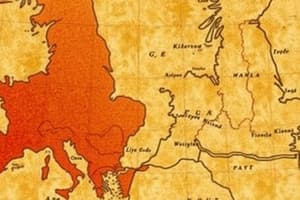Podcast
Questions and Answers
When did the Roman Occupation of Britain begin?
When did the Roman Occupation of Britain begin?
- 55 B.C. (correct)
- 410 A.D.
- 787 A.D.
- 597 A.D.
What important cultural and historical result did the Roman Occupation have on Britain?
What important cultural and historical result did the Roman Occupation have on Britain?
- Prevented Viking raids for several hundred years (correct)
- Spread of Christianity in Britain
- Establishment of the first English literature
- Introduction of the English language
Who was the 'other' St. Augustine that landed in Kent in 597 A.D.?
Who was the 'other' St. Augustine that landed in Kent in 597 A.D.?
- St. Augustine of Canterbury (correct)
- St. Augustine of Hippo
- St. Augustine of York
- St. Augustine of London
What was the official language during the Roman Occupation of Britain?
What was the official language during the Roman Occupation of Britain?
What important structure was built about 122 A.D. during the Roman Occupation of Britain?
What important structure was built about 122 A.D. during the Roman Occupation of Britain?
During which period did St. Augustine, who converted King Aethelbert to Christianity, land in Kent?
During which period did St. Augustine, who converted King Aethelbert to Christianity, land in Kent?
Which group was pushed into Wales and Ireland by the strong armed forces ('legions') during the Roman Occupation?
Which group was pushed into Wales and Ireland by the strong armed forces ('legions') during the Roman Occupation?
What event led to the departure of Romans from Britain in 410 A.D.?
What event led to the departure of Romans from Britain in 410 A.D.?
Which period saw the completion of Hadrian’s Wall in Britain?
Which period saw the completion of Hadrian’s Wall in Britain?
What was the official language during the Roman Occupation of Britain?
What was the official language during the Roman Occupation of Britain?
During the Roman Occupation, the practice of recording history led to the earliest English 'literature' being documentary.
During the Roman Occupation, the practice of recording history led to the earliest English 'literature' being documentary.
The Romans left Britain in 410 A.D. because of the Visigoth attack on Rome.
The Romans left Britain in 410 A.D. because of the Visigoth attack on Rome.
The Anglo-Saxon Period in Britain lasted from 410 A.D. to 787 A.D.
The Anglo-Saxon Period in Britain lasted from 410 A.D. to 787 A.D.
St. Augustine converted King Aethelbert to Christianity during the Viking Invasions in Britain.
St. Augustine converted King Aethelbert to Christianity during the Viking Invasions in Britain.
The Romans prevented Vikings from raiding Britain for several hundred years.
The Romans prevented Vikings from raiding Britain for several hundred years.
Study Notes
Roman Occupation of Britain
- The Roman Occupation of Britain began in 43 A.D.
- The Roman Occupation led to the introduction of Roman culture, language, and architecture, having a significant impact on British history and culture.
St. Augustine's Mission
- St. Augustine, who landed in Kent in 597 A.D., was not the same as the philosopher St. Augustine.
- St. Augustine converted King Aethelbert to Christianity during the Anglo-Saxon Period.
Language and Literature
- The official language during the Roman Occupation of Britain was Latin.
- The Roman Occupation led to the development of documentary literature, which marks the beginning of early English literature.
Infrastructure and Architecture
- Around 122 A.D., the Romans built Hadrian's Wall in Britain.
- The Romans built Hadrian's Wall during the reign of Emperor Hadrian.
Roman Departure and Anglo-Saxon Period
- The Romans left Britain in 410 A.D. due to the Visigoth attack on Rome.
- The Anglo-Saxon Period in Britain lasted from 410 A.D. to 787 A.D.
Consequences of Roman Occupation
- The Celts were pushed into Wales and Ireland by the Roman legions during the Roman Occupation.
- The Roman Occupation prevented Viking raids in Britain for several hundred years.
Studying That Suits You
Use AI to generate personalized quizzes and flashcards to suit your learning preferences.
Description
Test your knowledge of the early periods of English history, from the pre-Roman era to the Norman Conquest in 1066. Explore the Roman occupation, Anglo-Saxon period, Viking invasions, and the influence of Britons, Romans, Anglo-Saxons, and Normans.




